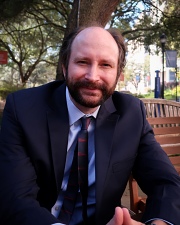Nathan Carlin, Ph.D.

Director
Samuel E. Karff Chair
Professor
Co-director, Clinical Humanities Certificate Program
McGovern Medical School
UTHealth Houston
Email: [email protected]
Phone: 713-500-5080
Biography
The Reverend Dr. Nathan Carlin is the Director of the McGovern Center for Humanities and Ethics at The University of Texas Health Science Center at Houston (UTHealth Houston). Dr. Carlin holds the Samuel Karff Chair and the rank of Professor.
Dr. Carlin is Editor-in-Chief of the Journal of Medical Humanities.
At McGovern Medical School, Dr. Carlin was elected as Chair of the Faculty Senate for 2018-2019, and has an appointment in the Department of Psychiatry. At the UTHealth School of Dentistry, he co-directs the Clinical Humanities Certificate Program for dental students, and he is a founding member of the National Collaborative on Humanities and Ethics in Dentistry.
Dr. Carlin is a medical humanities scholar with an interest in psychoanalysis and religion. His teaching interests include clinician-writing, pathography, death and dying, and literature and medicine.
For keynotes and Grand Rounds, Dr. Carlin can speak on the following topics: the founding of bioethics; the Hippocratic Oath; pastoral theology and principlism; secularization and medicine; psychoanalysis and religion; and the ethics of the fiction of Samuel Shem.
Dr. Carlin has published 12 books. In recent years, the focus of his writing has been oriented toward developing core texts for medical humanities. Some sample texts in this regard include Medical Humanities: An Introduction (Cambridge University Press); Teaching Health Humanities (Oxford University Press); Contemporary-Physician Authors: Exploring the Insights of Doctors Who Write (Routledge); Pathographies of Mental Illness (Cambridge University Press); The Secularization of Medicine (Oxford University Press); and Medicine, Meaning, and Identity (Oxford University Press).
Currently, Dr. Carlin is working with Renee Flores and Joanne Lynn, preparing the third edition of Handbook for Mortals: Guidance for People Facing Serious Illness, which is under contract with Oxford University Press.
Dr. Carlin received the 2025 Health Humanities Consortium Visionary Award for his critical contributions to the field of health humanities.
Educational Philosophy
In terms of educational theory, the thinker that has had the biggest impact on me is psychotherapist Carl Rogers, creator of the client-centered approach. In psychotherapy, Rogers argued that persons do not need to be “fixed” by mental health professionals. Rather, people are best helped when they are given freedom and when they are listened to with close attention. Rogers applied his views regarding psychotherapy to education, pioneering a student-centered approach. Just as clients do not need to be repaired by psychologists or psychiatrists, students do not need the pontifications of professors. Rogers felt that what his clients and his students needed most were autonomy and affirmation. Thus, Rogers argued against literary canons, and even exams. For Rogers, education is liberation; it is not the continued sanctification of tradition.
Following Rogers, while not quite as radical as him (e.g., I still affirm the value of exams), I see myself as a curator of curiosities. I expose students to materials that I find interesting, excellent, and beautiful. I want students to keep the books that I assign because they are so striking. While my choices of readings are, of course, political—as all such choices are—I do not insist on a “right” point of view in my classes. Students are encouraged to disagree with texts and each other.
Also, in terms of pedagogical method, I rarely lecture, unless the class is so large that a lecture is required. Instead, I facilitate discussions. Even when my class sizes are fairly large (e.g., 25 students), I still maintain a seminar format by means of “fish-bowl” discussions. In these, two circles are formed. The inner-circle sits at the table and discusses the text for the vast majority of the class, while the outer-circle sits in chairs beyond and around the table and actively listens. At the end of class, everyone gets a chance to speak. Students rotate session to session, alternating between the inner-circle and the outer-circle. For me, maintaining discussions—instead of lecturing—is key in terms of operationalizing Rogers’s insights because learning, if it is to be transformative, has its best chances of being so when it is active.
Education
Bachelor of Arts
Westminster College
Master of Divinity
Princeton Theological Seminary
Master of Arts
Rice University
Doctor of Philosophy
Rice University
Areas of Expertise and Interests
Research Interests
Medical Humanities and Bioethics
Pastoral Theology
Psychology of Religion
Publications
Carlin, N. (Ed.) (2021). Contemporary physician-authors: Exploring the insights of doctors who write. Routledge.
Carlin, N. (2020). Correlating bioethics and theology. American Journal of Bioethics, 20(12).
Carlin, N. (2015). Doctors and Dr. Seuss: Restoring the patient’s voice. Cambridge Quarterly of Healthcare Ethics, 24(1), 113-119.
Cole, T. R., Carlin, N., & Carson, R. A. (2014). Medical humanities: An introduction. Cambridge University Press.
Carlin, N. (2014). Religious mourning: Reversals and restorations in psychological portraits of religious leaders. Wipf and Stock Publishers.
Cole, T. R., & Carlin, N. (2009). The suffering of physicians. The Lancet, 374(9699), 1414-1415.